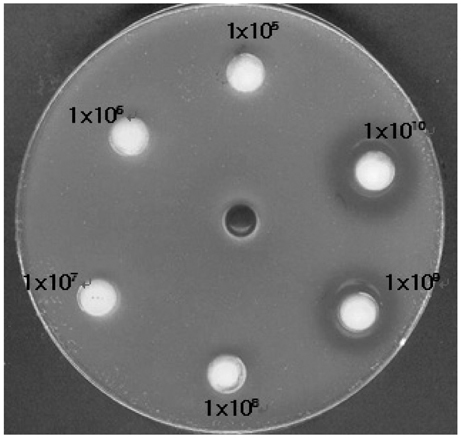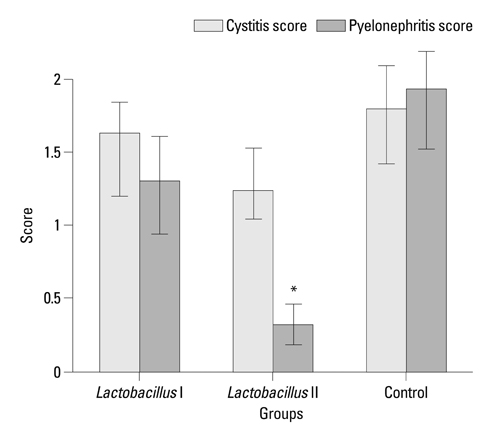Yonsei Med J.
2013 Mar;54(2):489-493. 10.3349/ymj.2013.54.2.489.
Preventive Effects of Lactobacillus Mixture on Experimental E. coli Urinary Tract Infection in Infant Rats
- Affiliations
-
- 1Department of Pediatrics, Kangnam Sacred Heart Hospital, Hallym University, Seoul, Korea.
- 2Department of Pathology, Ewha Womans University School of Medicine, Seoul, Korea.
- 3Department of Pediatrics, Ewha Womans University School of Medicine, Seoul, Korea. sjoolee@ewha.ac.kr
- KMID: 1503915
- DOI: http://doi.org/10.3349/ymj.2013.54.2.489
Abstract
- PURPOSE
Urinary tract infection (UTI) is an ascending infection of fecal uropathogens, urogenital lactobacilli are suggested to play a role in the prevention of UTI. This study was to investigate whether lactobacillus mixture (LM) could prevent the experimental infantile UTI.
MATERIALS AND METHODS
The LM were composed of three lactobacillus strains (L. gasseri, L. rhamnosus, and L. reuteri). Mother rats were grouped as lactobacillus (LB) group I (LB I, n=22), II (LB II, n=24) and control (n=20). LB I and LB II were fed with LM (1 mL/day) and control with phosphate-buffered saline (PBS) from late pregnancy through lactation. All newborn rats were breast-fed and their urine and stool were collected at the end of the 3rd week to compare lactobacillus colony. Then, infant rats from LB II were treated with intravesical instillation of LM. Infant rats from LB I and control were instilled with PBS. Twenty-four hours later, experimental UTI was introduced by intravesical instillation of standard E. coli strain. After 72 hours later, the infant rats were sacrificed for histologic examination.
RESULTS
Lactobacilli colonies in urine and stool were not statistically different among the three groups. The incidence of pyelonephritis in the LB II was 16.7% (4/24), LB I 72.7% (16.22) and control 75.0% (15/20) (p=0.015). The incidence of cystitis was not significantly different among the three groups.
CONCLUSION
The intravesically instilled LM significantly prevented experimental pyelonephritis in infant rats, however, LM administered orally to the pregnant and lactating mother rats did not.
MeSH Terms
Figure
Reference
-
1. Usein CR, Damian M, Tatu-Chiţoiu D, Căpuşă C, Făgăraş R, Mircescu G. Comparison of genomic profiles of Escherichia coli isolates from urinary tract infections. Roum Arch Microbiol Immunol. 2003. 62:137–154.2. Redondo-Lopez V, Cook RL, Sobel JD. Emerging role of lactobacilli in the control and maintenance of the vaginal bacterial microflora. Rev Infect Dis. 1990. 12:856–872.
Article3. Reid G, Bruce AW. Probiotics to prevent urinary tract infections: the rationale and evidence. World J Urol. 2006. 24:28–32.
Article4. Reid G, Chan RC, Bruce AW, Costerton JW. Prevention of urinary tract infection in rats with an indigenous Lactobacillus casei strain. Infect Immun. 1985. 49:320–324.
Article5. Asahara T, Nomoto K, Watanuki M, Yokokura T. Antimicrobial activity of intraurethrally administered probiotic Lactobacillus casei in a murine model of Escherichia coli urinary tract infection. Antimicrob Agents Chemother. 2001. 45:1751–1760.
Article6. Fraga M, Scavone P, Zunino P. Preventive and therapeutic administration of an indigenous Lactobacillus sp. strain against Proteus mirabilis ascending urinary tract infection in a mouse model. Antonie Van Leeuwenhoek. 2005. 88:25–34.
Article7. Reid G, Bruce AW, Taylor M. Instillation of Lactobacillus and stimulation of indigenous organisms to prevent recurrence of urinary tract infection. Microecol Ther. 1995. 23:32–45.8. Uehara S, Monden K, Nomoto K, Seno Y, Kariyama R, Kumon H. A pilot study evaluating the safety and effectiveness of Lactobacillus vaginal suppositories in patients with recurrent urinary tract infection. Int J Antimicrob Agents. 2006. 28:Suppl 1. S30–S34.
Article9. Stapleton AE, Au-Yeung M, Hooton TM, Fredricks DN, Roberts PL, Czaja CA, et al. Randomized, placebo-controlled phase 2 trial of a Lactobacillus crispatus probiotic given intravaginally for prevention of recurrent urinary tract infection. Clin Infect Dis. 2011. 52:1212–1217.
Article10. Lee SJ, Shim YH, Cho SJ, Lee JW. Probiotics prophylaxis in children with persistent primary vesicoureteral reflux. Pediatr Nephrol. 2007. 22:1315–1320.
Article11. Abad CL, Safdar N. The role of lactobacillus probiotics in the treatment or prevention of urogenital infections--a systematic review. J Chemother. 2009. 21:243–252.
Article12. Matsumiya Y, Kato N, Watanabe K, Kato H. Molecular epidemiological study of vertical transmission of vaginal Lactobacillus species from mothers to newborn infants in Japanese, by arbitrarily primed polymerase chain reaction. J Infect Chemother. 2002. 8:43–49.
Article13. Martín R, Langa S, Reviriego C, Jimínez E, Marín ML, Xaus J, et al. Human milk is a source of lactic acid bacteria for the infant gut. J Pediatr. 2003. 143:754–758.
Article14. Rinne M, Kalliomaki M, Arvilommi H, Salminen S, Isolauri E. Effect of probiotics and breastfeeding on the bifidobacterium and lactobacillus/enterococcus microbiota and humoral immune responses. J Pediatr. 2005. 147:186–191.
Article15. Hall MA, Cole CB, Smith SL, Fuller R, Rolles CJ. Factors influencing the presence of faecal lactobacilli in early infancy. Arch Dis Child. 1990. 65:185–188.
Article16. Sanz Y. Gut microbiota and probiotics in maternal and infant health. Am J Clin Nutr. 2011. 94:6 Suppl. 2000S–2005S.
Article17. Morelli L, Zonenenschain D, Del Piano M, Cognein P. Utilization of the intestinal tract as a delivery system for urogenital probiotics. J Clin Gastroenterol. 2004. 38:6 Suppl. S107–S110.
Article18. Lee JW, Shim YH, Lee SJ. Lactobacillus colonization status in infants with urinary tract infection. Pediatr Nephrol. 2009. 24:135–139.
Article19. Bruce AW, Chadwick P, Hassan A, VanCott GF. Recurrent urethritis in women. Can Med Assoc J. 1973. 108:973–976.20. Marrie TJ, Swantee CA, Hartlen M. Aerobic and anaerobic urethral flora of healthy females in various physiological age groups and of females with urinary tract infections. J Clin Microbiol. 1980. 11:654–659.
Article21. Gupta K, Stapleton AE, Hooton TM, Roberts PL, Fennell CL, Stamm WE. Inverse association of H2O2-producing lactobacilli and vaginal Escherichia coli colonization in women with recurrent urinary tract infections. J Infect Dis. 1998. 178:446–450.
Article22. Kirjavainen PV, Pautler S, Baroja ML, Anukam K, Crowley K, Carter K, et al. Abnormal immunological profile and vaginal microbiota in women prone to urinary tract infections. Clin Vaccine Immunol. 2009. 16:29–36.
Article23. Velraeds MM, van der Mei HC, Reid G, Busscher HJ. Inhibition of initial adhesion of uropathogenic Enterococcus faecalis by biosurfactants from Lactobacillus isolates. Appl Environ Microbiol. 1996. 62:1958–1963.
Article24. Zárate G, Nader-Macias ME. Influence of probiotic vaginal lactobacilli on in vitro adhesion of urogenital pathogens to vaginal epithelial cells. Lett Appl Microbiol. 2006. 43:174–180.
Article25. Rodríguez JM, Martínez MI, Horn N, Dodd HM. Heterologous production of bacteriocins by lactic acid bacteria. Int J Food Microbiol. 2003. 80:101–116.
Article26. Matsuzaki T, Chin J. Modulating immune responses with probiotic bacteria. Immunol Cell Biol. 2000. 78:67–73.
Article
- Full Text Links
- Actions
-
Cited
- CITED
-
- Close
- Share
- Similar articles
-
- Antimicrobial Effect of Lactobacillus in a Rat Model of Escherichia coli Urinary Tract Infection: A Preliminary Study
- Urinary Tract Infection Caused by Escherichia coli
- Clinical and Bacteriological Studies of Urinary Tract Infection in infection in Infant and Children
- Unexpected Septic Shock after Ureteroscopic Lithotripsy in a Patient Preoperatively Treated for a Urinary Tract Infection
- Lactobacillus and Urine Microbiome in Association with Urinary Tract Infections and Bacterial Vaginosis




